Fashion Designer, College President, Educator, and Peacebuilder Named 2025 Honorary Degree Recipients
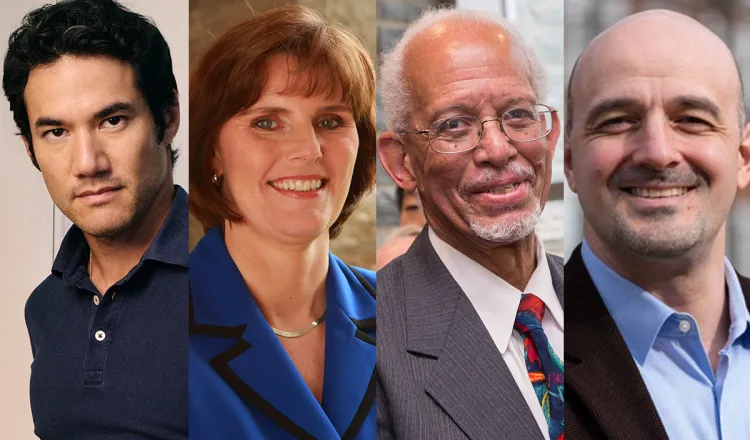
From left: Joseph Altuzarra ’05 (photo by Jon Ervin); Kimberly Wright Cassidy ’85 (photo courtesy of Bryn Mawr College); Maurice Eldridge ’61 (photo by Larry Kesterson); and Shamil Idriss ’94.
During Swarthmore College’s 153nd Commencement ceremony on May 25, President Valerie Smith will award honorary degrees to fashion designer Joseph Altuzarra ’05, college president Kimberly Wright Cassidy ’85, educator Maurice Eldridge ’61, and peacebuilder Shamil Idriss ’94.
Joseph Altuzarra ’05
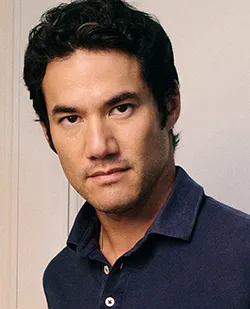
Joseph Altuzarra ’05 is an award-winning luxury fashion designer globally recognized for his innovative contributions to the industry. The son of a Chinese American mother and a French father, he launched his brand, Altuzarra, in 2008, which he says is informed by his curiosity about the world and his multicultural background and upbringing.
As a child, Altuzarra studied ballet for eight years in Paris before moving to the U.S. to attend Swarthmore, where he majored in art and art history and was a member of the track & field team. After graduation, Altuzarra interned at Marc Jacobs before joining the fashion house of Proenza Schouler. Seeking to enhance his technical construction skills, Altuzarra then apprenticed with patternmaker Nicolas Caïto, the former head of the Rochas atelier. Altuzarra later returned to Paris, working as first assistant to Givenchy’s Riccardo Tisci.
Altuzarra’s designs have been worn by iconic women, such as Michelle Obama, Beyoncé, Julianne Moore, and Rihanna. For the past several years, notable figures including Awkwafina, Hillary Clinton, and Ariana DeBose have worn his designs on the red carpet at the Met Gala.
In addition to his acclaimed fashion lines, Altuzarra has earned a reputation for weaving environmentally responsible practices into his work. He’s also advocated for more diversity and inclusion within the industry, recently telling W Magazine that, “As a queer Asian man, it was always on my mind and important, but now it’s become a guiding light and purpose in my work.”
In 2022, Altuzarra co-hosted the Council of Fashion Designers of America (CFDA) Fashion Awards. He’s also the recipient of numerous awards, including the CFDA/Vogue Fashion Fund Award in 2011 and the CFDA Swarovski Award for Womenswear Design in 2012.
“I feel deeply honored and humbled by this meaningful recognition. Swarthmore College is much more than my alma mater — not only did it help shape my mind and character, broadening my horizons and challenging my perspectives, it is also where I fostered lifelong friendships, discovered kindred spirits, and truly blossomed as an individual. I am profoundly grateful and touched by this acknowledgement.”
Kimberly Wright Cassidy ’85
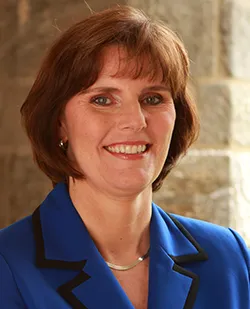
Kimberly Wright Cassidy ’85 spent a career dedicated to changing generations of lives through the transformational power of a liberal arts education. A McCabe Scholar and varsity basketball, lacrosse, and tennis player at Swarthmore, Cassidy majored in psychology and graduated Phi Beta Kappa with distinction. She earned her master’s and Ph.D. in psychology at the University of Pennsylvania.
Cassidy joined Bryn Mawr College as a psychology professor in 1993. In 2007, she assumed the role of provost, and in 2013, she was named Bryn Mawr’s ninth president, a role in which she served until retiring in 2024.
As both provost and president, Cassidy promoted academic innovation and partnered with faculty to develop new programs and approaches to teaching in a liberal arts context. Under her leadership, Bryn Mawr created its distinctive multidisciplinary 360° course clusters; added new interdisciplinary academic programs and majors, including neuroscience, data science, and international studies; and worked with Haverford and Swarthmore colleges to develop Tri-Co Philly, a collaborative, experiential learning program based in Philadelphia.
As president, Cassidy prioritized creating a more diverse and equitable community. As part of that commitment, she expanded access to a Bryn Mawr education through significant improvements to the college’s financial aid program, including increasing the financial aid budget by more than 50%, leading a fundraising campaign that raised more than $60 million for student aid, and eliminating student loans for families with annual incomes below $110,000.
Under Cassidy’s leadership, Bryn Mawr substantially increased administrative, faculty, and staff diversity, worked to address institutional legacies of exclusion, and created a wide array of programmatic support to foster inclusion and opportunities for community learning.
Cassidy also led the development of Excellence in Action, a strategic vision for Bryn Mawr’s undergraduate college, and initiatives to enhance the college’s distinctive, select graduate programs. As part of that strategy, a new Student Life and Wellness Building opened in the center of campus in 2022. This building advances a holistic concept of health and wellness, where students learn to care for themselves and the communities that are important to them.
Throughout her presidency, Cassidy demonstrated a commitment to Bryn Mawr’s people and community. Through increased research support and significant salary improvements — particularly for hourly-wage staff and students — she prioritized investment in those who shape the college’s distinctive educational experience. She also championed community-building programs that brought students, faculty, and staff together in celebration.
Cassidy is a public advocate for gender equity, focusing on equity issues in STEM disciplines and workplaces.
“I am incredibly humbled to receive this honorary degree, particularly from President Smith, whom I deeply admire and who has been an invaluable Tri-Co colleague. My education at Swarthmore changed my life and built the foundation for a career dedicated to excellence in education. To be honored by Swarthmore for those accomplishments represents a full-circle moment that I never imagined. This recognition means the world to me, coming from a place that has given me so much.”
Maurice Eldridge ’61
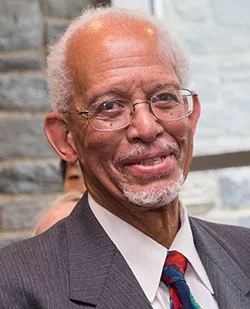
Maurice Eldridge ’61’s long career and deep commitment to education and the arts have had a lasting impact on the Swarthmore College community. The grandson of a Baptist minister, he credits his inspiration for becoming an educator to his deep admiration for teachers, both in the public, segregated junior high he attended in Washington, D.C., and at the progressive, integrated boarding school he attended in Lenox, Mass.
Eldridge earned a B.A. with Honors in English literature from the College and an M.Ed. from the University of Massachusetts–Amherst. Early in his career, he taught English and creative writing before transitioning to roles in education administration at the Massachusetts Department of Education and the Windsor Mountain School in Lenox, Mass. Eldridge then notably served for a decade as the influential principal and director of the Duke Ellington School of the Arts in his hometown of Washington, D.C.
Growing up in the segregated South shaped Eldridge in immeasurable ways. He was a vocal supporter of school integration in the late 1950s, and, as a sophomore at Swarthmore, helped organize a march on Washington, D.C., to advocate for change. In his 2009 baccalaureate address, he described how his work made him a target on campus and how a hate-filled, racist note from a fellow student deeply wounded him, prompting him to leave Swarthmore. A year later, he came back with greater conviction and a determination to be himself and to fight for social justice.
Eldridge returned again in 1989 for a College leadership role, underscoring his enduring belief in what he calls Swarthmore’s virtue of “always wanting to be better than it finds itself at the present moment.” For nearly three decades, he mentored students, especially Black and first-generation students. Once described as “the spiritual and moral heart of the Black community at the College,” Eldridge served the entire College community with integrity, skill, and compassion.
He also became deeply involved in the Chester community, and his initial support and advocacy helped make the Chester Children’s Chorus a reality. His fervent championing of the Chorus over the 30 years since its founding has been critical to its longevity. In addition, Eldridge’s work to expand upon the Chorus’ success culminated with the opening of what is now called the Chester Charter Scholars Academy, a K-12 school in Chester, Pa., with an arts-integrated curriculum. Eldridge once described the work to establish the school as “community building at its best.”
“I am deeply moved by the offer of an honorary degree by my beloved Swarthmore College, a school I discovered through the experience of the wonderful headmaster, of the very progressive boarding school I attended in the Western Massachusetts town of Lenox, who believed in his alma mater and in its value for me. He was right, and I am forever grateful to him for the life I have been able to spend engaged with the development and growth of the many adolescents whom I was able to help move onward and upward as they grew to know themselves well, and free into life their best inner selves. Grateful am I, on their behalf, for the opportunities we can offer through caring and supportive educational engagement with each and all of them. I sought to teach them by being a model of the values I sought to inspire in them. I sometimes shared with them the words in the life and music of Mahalia Jackson, ‘I'm going to live the life I sing about in my songs!’ Amen and thanks to you all.”
Shamil Idriss ’94
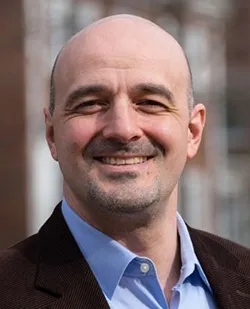
Shamil Idriss ’94 is the chief executive officer of Search for Common Ground (Search), a global nonprofit committed to transforming conflict into cooperation. With more than 650 staff in 35 countries, Search is the world’s largest dedicated peace building organization and was nominated by the Quakers for the 2018 Nobel Peace Prize.
Since becoming CEO in 2014, Idriss has expanded Search’s reach and influence, leading mergers and strategic partnerships with U.N. agencies, global NGOs, and multinational corporations.
“Your work in Burundi helped prevent genocide,” former U.S. Secretary of State John Kerry said in 2016, describing Search’s impact, “... and during the Iran [nuclear] talks, the fresh ideas you provided helped us achieve a breakthrough.” In 2024, then-U.N. Undersecretary General for Humanitarian Affairs Martin Griffiths lauded Search, saying of a partnership that Idriss established with the U.N., “We can not only save lives — we also have the opportunity to address the conflict-drivers that create these crises in the first place.”
Prior to his time at Search, Idriss was CEO of Soliya, an organization that equips young adults to approach differences constructively and with empathy so that they may thrive in an interconnected world. His work at Soliya led to the establishment of the Ambassador J. Christopher Stevens Virtual Exchange Initiative. Announced by President Obama in 2015, the initiative seeks to use technology to connect young people from around the world for learning and collaboration. The EU created a parallel program in 2017.
From 2004-05, Idriss helped establish and served on the World Economic Forum’s Council of 100 Leaders. In 2005, U.N. Secretary-General Kofi Annan appointed him deputy director of the U.N. Alliance of Civilizations, supporting former heads of state, foreign ministers, and senior religious leaders in joint initiatives to prevent conflict and improve relations between Western and Muslim-majority countries.
Idriss, who majored in economics and philosophy at Swarthmore, is a thought leader in international peace and conflict. His commentary regularly appears in mainstream media outlets and he has delivered addresses at the World Economic Forum, Global Philanthropy Forum, Skoll World Forum, GreenBiz, and SXSW EDU. He serves on the boards of Giving Tuesday, Ploughshares Fund, and Soliya, and received the Open Society Foundation’s New Executive Award (2015) and Swarthmore’s Eugene M. Lang ’38, H’81 Impact Award (2024).
“To receive an honorary degree from Swarthmore in recognition of the most fulfilling pursuit I could imagine — a vocation which I may never have found had I not studied here — is meaningful to me beyond words. Peace building is the stubborn insistence that a better world is not only possible but inevitable — if we work for it. Swarthmore instilled in me this conviction and provided opportunities and skills to put it into practice. By definition, peace building is also not a solo exercise. So I humbly accept this honor in recognition of the audacity, tenacity, and courage of hundreds of colleagues and partners who take bigger risks than I ever have to build a safer and more just world.



